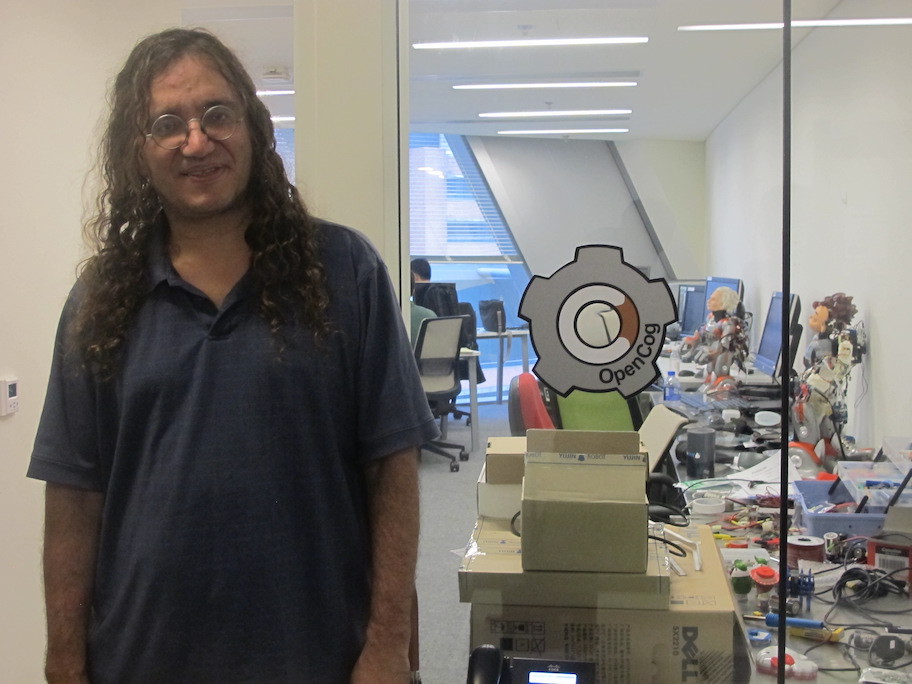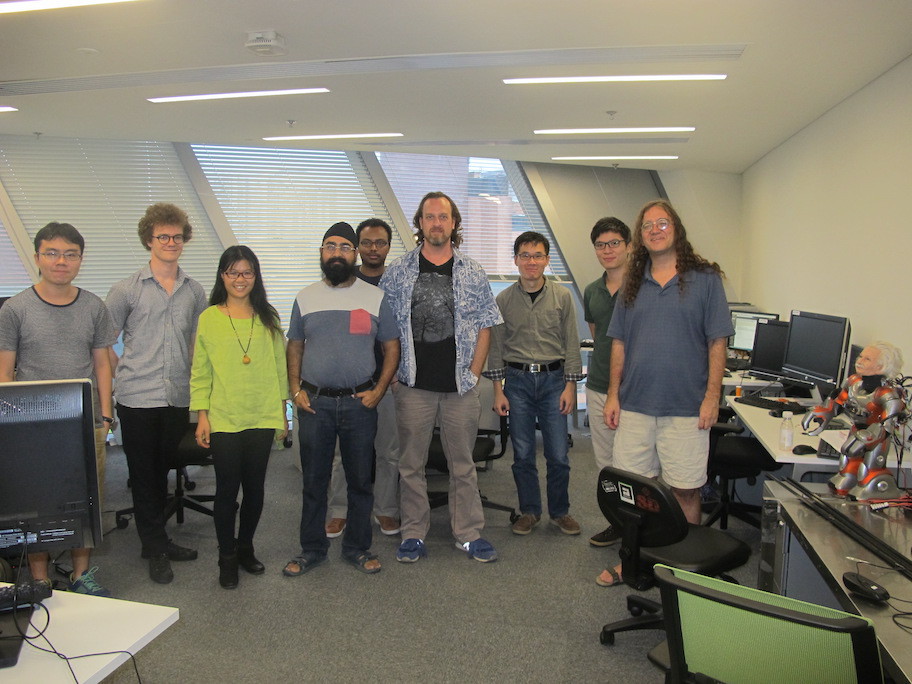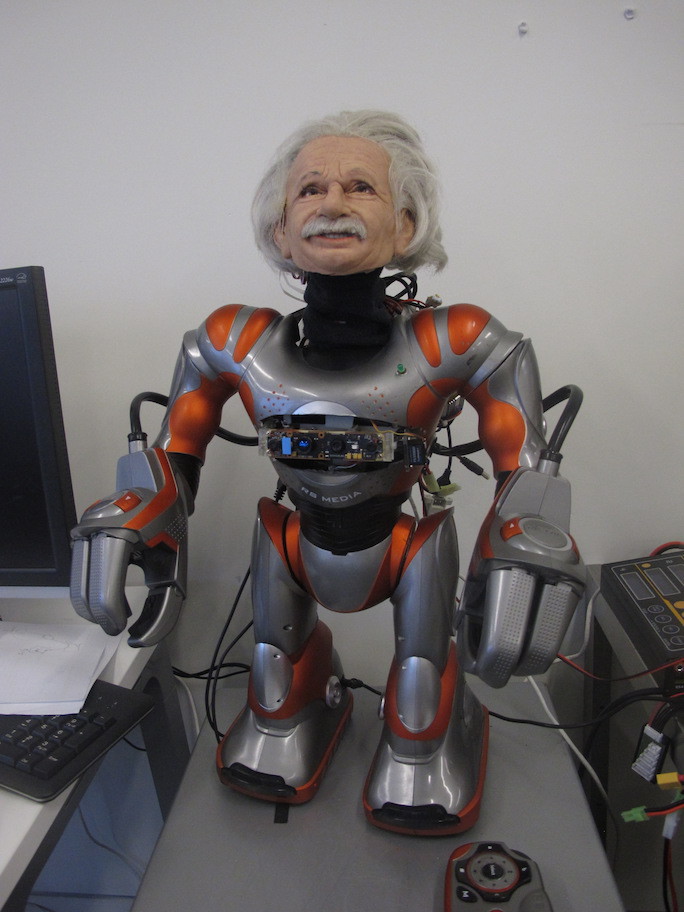In the den of Frankenstein
Few real geeks doubt that artificial intelligence will be created. The only question is by whom, when and how. Probably the most typical is the opinion that it will be created by some large corporation such as Google. After all, it is about the success of corporations that we most often hear. For example, few people know about the Watson program created by IBM, or about Google’s purchase of a number of robotic (and not only ) firms. Much less often you can hear about those researchers and projects in the field of strong AI that are not associated with large corporations. We want to fill this gap a little by telling about our impression of communicating with Ben Goertzel ( whose translation of one article was on geektimes) in his laboratory, where his project is developingOpenCog , briefly described in the article , and at the same time wonder if such groups have a chance to overtake the giants?

It is worth noting that Ben Goertzel is one of the main initiators of the AGI (General Artificial Intelligence) movement, in particular, thanks to him such collective monographs as “Artificial General Intelligence (Cognitive Technologies)” and “Theoretical Foundations of Artificial General Intelligence” appeared, and International conferences on general artificial intelligence also began to take place, which allowed us to somehow consolidate the AGI community. Ben Goertzel previously established firms such as Novamente and Biomind. In general, this person is not just a scientist, but an organizer and businessman. So why, of all the possible ways, did he now choose a way to deal with the OpenCog project using grant funds on the basis of the Hong Kong Polytechnic University?
This project is far from the only thing he does. He is also involved in applying the results of OpenCog development in commercial applications, in particular in bioinformatics for DNA analysis and in predicting financial time series. However, as he told us, he is the last to deal with the need, in particular, to provide for his children and, if possible, to financially support future AGI developments, which are his main goal. According to him, this is not the optimal form of work on AGI, but so far the best that he was able to achieve. In his group there are more than a dozen people who can work on the project without being distracted by anything else. In addition, he collaborates with a laboratory in Addis Ababa, which on its own initiative joined the development of OpenCog. Being an open source project,

How much is this compared to corporations? It may seem that no. Indeed, under the direction of Kurzweil, which Google was able to lure a couple of years ago to itself , there are six laboratories, one of which, in particular, is led by Lux, the author of the original version of the MOSES genetic programming system, which is now being developed by Goertzel’s team as part of OpenCog. Goertzel himself was repeatedly invited to work at Google, but he always refused this. According to him, they are not trying to create AGI there. Google redirects the activities of hired researchers, including AGI enthusiasts, to goals related to maximizing Google’s profits in the not too distant future. Yes, often relevant developments, such as Knowledge Graph, are positionedas a move towards a strong AI. But Google only to a small extent develops technologies of strong AI, and to a much greater extent deals with the use and adaptation of these technologies to solve its commercial task ¬– information retrieval. We had about the same impression from a conversation with Laurent Orsu ¬– one of the organizers of the AGI conferences who moved to work at DeepMind (now a division of Google) a few months ago: although he didn’t say so directly, but apparently DeepMind is now more Degree is engaged in the application of previously developed technologies to the scope of Google.
Thus, Herzel is not interested in moving to a large corporation, since he believes that this will lead to a decrease in the productivity of his move specifically to AGI. And this is not just the opinion of a random person, based on general considerations. There are very serious reasons for it, although this is still a subjective opinion, to which, for example, personal ambitions can be mixed.
But is it possible to create a real AI without possessing the resources of corporations? Herzel believes this is possible. Moreover, he plans to do this in a fairly short time, as he announced at the AGI'12 conference. However, some Goertzel lab employees call Ben a great optimist and believe that his plans would be implemented within five years with more substantial funding (and the implementation of these plans will lead to real AI only if the initial premises are correct), and this will require ten to twenty years.

In addition to the limited staffing resources, there are also some aspects related to hardware. OpenCog is now largely a symbolic cognitive architecture. However, the present AGI is likely to be an embodied agent. The most direct way to do this is to place the AGI in the body of the robot. Now there are some robots in Ben's laboratory. However, real AGI will require robots of a completely different level. Now OpenCog is more used for virtual agents (game characters), but the game world may not be rich enough to form a full-fledged intelligence. Therefore, the question still remains open for Goertzel - whether to look for collaborators for the development of the robotics direction or to consider other ways of creating embodied intelligence based on the information that is on the Internet.


So, purposefully and productively dealing with AGI at the industrial level is very difficult for everyone, including Ben Goertzel. Despite all appearances, corporations, even such as Google, are not directly involved in it, although their activity in the field of applied AI is growing, and in the future we are not immune from the scenario of creating a real AI in the corporation. Although the topic of AGI is getting hotter, private investment under pure AGI development is also problematic. In this connection, Ben mentioned Dmitry Itskov, with whom he crossed several times, as an example of the fact that it is easier to find financing for work to achieve immortality directly than according to AGI (although for Ben himself, AGI is also a way to immortality, explain to investors why this way is more likely to succeed,
Problems with serious investment in the AGI area are typical. So, a few months ago, we managed to talk with another AGI enthusiast - Peter Voss. He said that he had a break of several years in productive work on his cognitive architecture, and only recently had he managed to find investments again to continue, but their volume was very limited. In this sense, Ben was able to create better conditions for his project (and the substantial side of his project is perhaps much stronger).
Work on the AGI does not look like a race, but rather like an obstacle race. The obstacles are different on different tracks, and each AGI enthusiast chooses his own. Who has more chances - time will tell. In the meantime, I would like to wish good luck to projects such as OpenCog than corporate development.
It is worth noting that Ben Goertzel is one of the main initiators of the AGI (General Artificial Intelligence) movement, in particular, thanks to him such collective monographs as “Artificial General Intelligence (Cognitive Technologies)” and “Theoretical Foundations of Artificial General Intelligence” appeared, and International conferences on general artificial intelligence also began to take place, which allowed us to somehow consolidate the AGI community. Ben Goertzel previously established firms such as Novamente and Biomind. In general, this person is not just a scientist, but an organizer and businessman. So why, of all the possible ways, did he now choose a way to deal with the OpenCog project using grant funds on the basis of the Hong Kong Polytechnic University?
This project is far from the only thing he does. He is also involved in applying the results of OpenCog development in commercial applications, in particular in bioinformatics for DNA analysis and in predicting financial time series. However, as he told us, he is the last to deal with the need, in particular, to provide for his children and, if possible, to financially support future AGI developments, which are his main goal. According to him, this is not the optimal form of work on AGI, but so far the best that he was able to achieve. In his group there are more than a dozen people who can work on the project without being distracted by anything else. In addition, he collaborates with a laboratory in Addis Ababa, which on its own initiative joined the development of OpenCog. Being an open source project,
How much is this compared to corporations? It may seem that no. Indeed, under the direction of Kurzweil, which Google was able to lure a couple of years ago to itself , there are six laboratories, one of which, in particular, is led by Lux, the author of the original version of the MOSES genetic programming system, which is now being developed by Goertzel’s team as part of OpenCog. Goertzel himself was repeatedly invited to work at Google, but he always refused this. According to him, they are not trying to create AGI there. Google redirects the activities of hired researchers, including AGI enthusiasts, to goals related to maximizing Google’s profits in the not too distant future. Yes, often relevant developments, such as Knowledge Graph, are positionedas a move towards a strong AI. But Google only to a small extent develops technologies of strong AI, and to a much greater extent deals with the use and adaptation of these technologies to solve its commercial task ¬– information retrieval. We had about the same impression from a conversation with Laurent Orsu ¬– one of the organizers of the AGI conferences who moved to work at DeepMind (now a division of Google) a few months ago: although he didn’t say so directly, but apparently DeepMind is now more Degree is engaged in the application of previously developed technologies to the scope of Google.
Thus, Herzel is not interested in moving to a large corporation, since he believes that this will lead to a decrease in the productivity of his move specifically to AGI. And this is not just the opinion of a random person, based on general considerations. There are very serious reasons for it, although this is still a subjective opinion, to which, for example, personal ambitions can be mixed.
But is it possible to create a real AI without possessing the resources of corporations? Herzel believes this is possible. Moreover, he plans to do this in a fairly short time, as he announced at the AGI'12 conference. However, some Goertzel lab employees call Ben a great optimist and believe that his plans would be implemented within five years with more substantial funding (and the implementation of these plans will lead to real AI only if the initial premises are correct), and this will require ten to twenty years.

In addition to the limited staffing resources, there are also some aspects related to hardware. OpenCog is now largely a symbolic cognitive architecture. However, the present AGI is likely to be an embodied agent. The most direct way to do this is to place the AGI in the body of the robot. Now there are some robots in Ben's laboratory. However, real AGI will require robots of a completely different level. Now OpenCog is more used for virtual agents (game characters), but the game world may not be rich enough to form a full-fledged intelligence. Therefore, the question still remains open for Goertzel - whether to look for collaborators for the development of the robotics direction or to consider other ways of creating embodied intelligence based on the information that is on the Internet.
So, purposefully and productively dealing with AGI at the industrial level is very difficult for everyone, including Ben Goertzel. Despite all appearances, corporations, even such as Google, are not directly involved in it, although their activity in the field of applied AI is growing, and in the future we are not immune from the scenario of creating a real AI in the corporation. Although the topic of AGI is getting hotter, private investment under pure AGI development is also problematic. In this connection, Ben mentioned Dmitry Itskov, with whom he crossed several times, as an example of the fact that it is easier to find financing for work to achieve immortality directly than according to AGI (although for Ben himself, AGI is also a way to immortality, explain to investors why this way is more likely to succeed,
Problems with serious investment in the AGI area are typical. So, a few months ago, we managed to talk with another AGI enthusiast - Peter Voss. He said that he had a break of several years in productive work on his cognitive architecture, and only recently had he managed to find investments again to continue, but their volume was very limited. In this sense, Ben was able to create better conditions for his project (and the substantial side of his project is perhaps much stronger).
Work on the AGI does not look like a race, but rather like an obstacle race. The obstacles are different on different tracks, and each AGI enthusiast chooses his own. Who has more chances - time will tell. In the meantime, I would like to wish good luck to projects such as OpenCog than corporate development.
